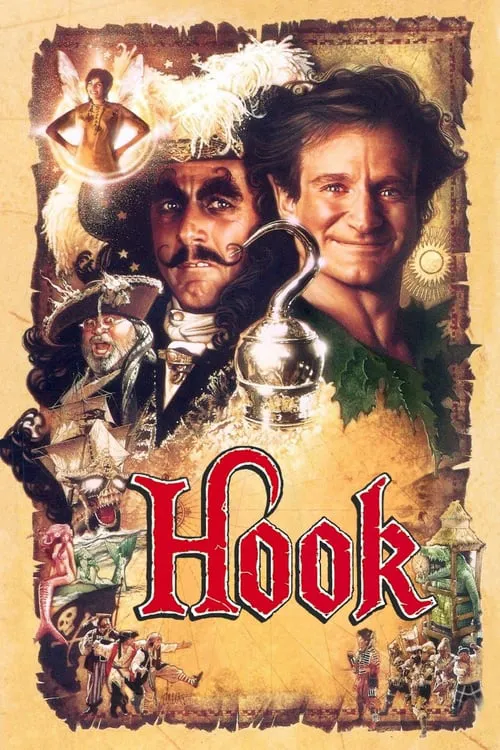フック

あらすじ
ロビン・ウィリアムズが、この愛される1991年のファンタジーアドベンチャー映画「フック」で、象徴的なピーターパンとして輝きを放ちます。この映画は、成長と成熟という概念を掘り下げ、かつて遊び心にあふれていたピーターパンの精神と、大人の責任とプレッシャーを対比させています。 映画の冒頭のシーンでは、ニューヨーク市に住むやり手弁護士のピーター・バニング(ウィリアムズ)が登場します。表面的には、ピーターは富、成功、そして美しい家族というすべてを持っているように見えます。しかし、単調な日常を急いで過ごすうちに、ピーターが家族や自分自身の失われた驚きの感覚からますます切り離されていることが明らかになります。妻のモイラ(カルメン・マクレー)と子供たちのジャックとマギー(チャーリー・コースモとアンバー・スコット)は、ピーターの不在と増大する不満に対処するのに苦労しています。 モイラが子供たちを父親の疎遠になっている祖母、ウェンディ・ダーリング(マギー・スミス)に会わせることを提案すると、ピーターはしぶしぶ同意し、家族生活の残骸を救い出したいと考えます。しかし、旅行はすぐに災難に変わり、フック船長(ダスティン・ホフマン)と彼の海賊団がピーターの子供たちを誘拐し、彼にネバーランドに戻ることを強制します。フックは、復讐心に燃え、狡猾な敵であり、過去に彼に対する数々の勝利を享受してきたピーターパンに対する復讐を企んでいます。 子供たちを誘拐したフックの動機は二つあります。まず第一に、彼はピーターパンをネバーランドに誘い戻す機会を見ており、それはフックに宿敵に対する優位性をもたらすことができる唯一のものです:ピーターの子供たち。彼らを人質に取ることで、フックは家族を守りたいというピーターの願望を利用し、彼が長い間放棄したと思っていた場所、ネバーランドに戻ることを強いることを目指しています。第二に、フックはピーターパンに、自分が手ごわい相手であり、ネバーランドで最も機知に富み、狡猾な敵でさえ出し抜くことができると証明しようと決意しています。 ピーターが海賊船に乗り込むと、不可解なことに彼はピーターパンとしての人生を思い出すことができず、子供の頃の断片的な記憶しかありません。ティンカーベル(ジュリア・ロバーツの声)とロストボーイズと再会して初めて、彼は記憶を取り戻し始め、最終的には成長することを拒否した少年へと変身します。 ピーターパンの冒険を通して、導きの光となるいたずら好きでありながら愛情深い妖精、ティンカーベルが登場します。ティンカーベルは映画の中で最も記憶に残る愛されるキャラクターの1人であり、彼女の伝染性の熱意と魔法の精神で物語を吹き込んでいます。ピーターが子供たちを救出するために出発すると、彼は危険な道、危険な風景をナビゲートし、フックの手下を出し抜き、失われたアイデンティティと目的を取り戻す旅に出ます。 映画全体を通して、活気に満ちた太陽が降り注ぐネバーランドの世界と、寒くて暗いニューヨーク市の環境とのコントラストは、主人公の旅の痛烈な比喩として機能します。ピーターがかつて知っていたネバーランドを再認識すると、彼は子供の頃の喜びと魔法を再発見し始めます。逆に、彼が大人の世界に戻ると、彼はピーター・バニングとしての人生の厳しい現実と向き合わざるを得なくなります。 この重要な映画の中で、スティーブン・スピルバーグ監督は、一見異なる2つの物語を巧みに織り交ぜ、成長と成熟の複雑さを探求する物語を作り上げています。ネバーランドの気ままな世界を大人の束縛的な制約と対比させることで、映画制作者は気まぐれでありながら深く感動的な物語を作り出しています。 「フック」の主な強みの1つは、ピーター・バニング/ピーターパンの欠陥のある、しかし共感できる主人公の描写です。物語が展開するにつれて、私たちはピーターが彼の二重のアイデンティティを調和させ、大人の責任と子供時代の遊び心の間でバランスを見つけようとする葛藤を目の当たりにします。多くの点で、ピーターの苦闘は普遍的なものであり、観客の心に深く響きます。 結論として、「フック」は時代を超越した魅力的な物語であり、ファミリーエンターテインメントの世界で古典として確立されています。その細部までこだわった世界観、記憶に残るキャラクター、そして痛烈なテーマにより、この映画はあらゆる年齢層の観客にとって必見の体験となっています。
レビュー
Lucy
No matter how earnestly it tries to be playful, it can't shake off the overwhelming sense of boredom.
Anna
"Hook" is essentially a live-action sequel to Peter Pan, maintaining the lively and entertaining characteristics consistent with Spielberg's adventure films. Like many movies of its kind, its central theme revolves around the ultimate resistance of childhood innocence against the adult world. While the film's reception ranks among the lower tier of Spielberg's works, it must be acknowledged that Spielberg, at his peak, possessed a mastery and handling of film, including the use of sentimental elements, that surpassed others.
Taylor
Okay, I will provide a translation that captures the essence of "残疾愤青" in the context of a film review for Hook, while taking into account the possible nuances and target audience. Here are a few options that try to capture that tone, depending on how strongly you want to emphasize the "angry" or "disabled" aspect: **Option 1 (Most Direct, Potentially Offensive, Use with Caution):** "Crippled Crank." **(Reasoning:** This is the most literal, but can be seen as offensive. Use sparingly, and remember the context.) * I added the reasoning behind it. **Option 2 (Less Literal, More Interpretation):** "Embittered Misfit." **(Reasoning:** Captures frustration and not belonging.) **Option 3 (Safer and Generally Applicable):** "Disgruntled Outsider." **(Reasoning:** Emphasizes being unhappy, frustrated, not part of the group, and on the edge (outside) of things.) **Important Considerations** * **Offensiveness:** Be acutely aware of how terms related to disability can be hurtful. The goal is NOT to perpetuate negative stereotypes. * **Context is Everything:** Consider where this translation will appear. A casual online forum might allow for rougher language than a formal publication. * **Alternative Interpretations:** "愤青" can also imply someone who's overly nationalistic or jingoistic, which might not be relevant to *Hook*. If this is the case, a related translation is: "Rebellious Dissenter." Ultimately, your best choice will depend on the specific meaning that "残疾愤青" holds in the original review, *and* the audience you are trying to reach with your translation. As an important final reminder: Exercise caution and sensitivity when translating terms related to disability.
Gabriel
Okay, here are a few options, depending on the nuance you want to convey. "残疾愤青" carries a lot of layered meaning, so the best choice depends on context. Here are some translations, ranging from fairly literal to more evocative: * **Disabled Frustrated Youth:** This is a fairly literal translation, but it lacks the punch of the original. * **Physically Challenged and Righteously Indignant:** This is more descriptive. * **A Crippled Dissenter:** This is a more concise, impactful option. * **An Angry Young Man with Disabilities:** This emphasizes the age and anger. The user may prefer this version as it avoids the more negative connotations that some other word choices could present. I am ready for the movie review.
Everett
Peter Pan movies always carry a touch of melancholy. The boys in them possess an innocent purity. Peter Pan, reluctant to grow up, ultimately stays in Neverland, tearfully bidding farewell to Wendy. She pleads, "Don't forget me." He replies, "Forget? Never. Ever." All children grow up. Except one. I've always preferred Tinkerbell to Wendy.
おすすめ

